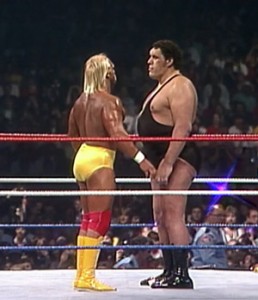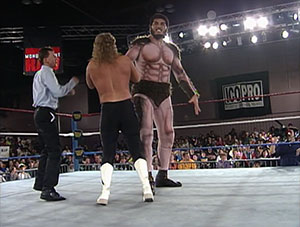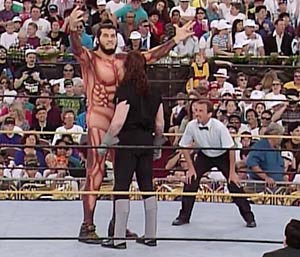Who Killed WCW? A Publish-Mortem of a Wrestling Big
Associated Articles: Who Killed WCW? A Publish-Mortem of a Wrestling Big
Introduction
With nice pleasure, we are going to discover the intriguing subject associated to Who Killed WCW? A Publish-Mortem of a Wrestling Big. Let’s weave fascinating info and provide contemporary views to the readers.
Desk of Content material
Who Killed WCW? A Publish-Mortem of a Wrestling Big

The autumn of World Championship Wrestling (WCW) in 2001 stays a fascinating case research in company mismanagement, inventive stagnation, and the unpredictable nature of the wrestling enterprise. Whereas no single issue could be solely blamed, a confluence of missteps, inside conflicts, and exterior pressures in the end led to its demise, leaving a legacy of "what ifs" and cautionary tales for the business. This text will discover the important thing gamers and contributing elements that led to WCW’s absorption by its rival, WWE, successfully ending an period in skilled wrestling.
The Reign of Eric Bischoff and the Nitro Period:
The late Nineties noticed WCW obtain unprecedented success, largely because of the management of Eric Bischoff and the revolutionary "Monday Nitro" present. By immediately competing with WWE’s "Monday Night time Uncooked," Nitro capitalized on WWE’s perceived inventive shortcomings, attracting an enormous viewers with its sooner tempo, edgier storylines, and the emergence of charismatic stars like Hulk Hogan, Ric Aptitude, and Sting. This era represented WCW’s zenith, a time of excessive rankings and important cultural affect. Nonetheless, this success masked underlying issues that might finally show deadly.
Bischoff’s management, whereas initially visionary, turned more and more erratic. His focus shifted from long-term strategic planning to short-term rankings beneficial properties, usually sacrificing coherent storytelling for shock worth and fleeting moments of pleasure. The overreliance on established stars, whereas initially a draw, finally led to inventive stagnation and an absence of funding in growing new expertise. The corporate’s reliance on established stars meant that there was little room for development and new expertise, thus hindering the long-term sustainability of the corporate. The fixed shifting of the championship belts additionally devalued the status of the titles.
Inventive Conflicts and Expertise Exodus:
Inner conflicts plagued WCW all through its ultimate years. Inventive variations between Bischoff, different executives, and wrestlers continuously resulted in inconsistent reserving and pissed off performers. The shortage of a cohesive inventive path led to storylines that have been usually convoluted, nonsensical, or just lacked affect. This inside discord created an surroundings of uncertainty and instability, driving away each established and rising expertise.
Many wrestlers, disillusioned by the chaotic reserving and lack of alternatives, jumped ship to WWE, additional weakening WCW’s roster. The lack of key figures, each in entrance of and behind the digital camera, created a ripple impact, diminishing the standard of the product and eroding viewers confidence. The expertise exodus wasn’t merely about higher pay; it was additionally a few perceived lack of respect and a way that their careers have been higher served elsewhere.
Monetary Mismanagement and Turner Broadcasting’s Function:
WCW’s monetary struggles have been a major contributing issue to its downfall. Whereas the Nitro period introduced in substantial income, the corporate’s spending habits have been usually reckless, with exorbitant contracts and an absence of fiscal duty. The lavish spending on expertise and manufacturing, with out a corresponding enhance in income streams, created a precarious monetary scenario.
Turner Broadcasting, WCW’s mum or dad firm, performed a major position within the firm’s demise. Whereas initially supportive, Turner’s dedication to WCW waned as the corporate’s rankings declined and monetary losses mounted. The shortage of constant funding and strategic steerage from Turner contributed to WCW’s incapability to adapt to the altering panorama of the wrestling business. There was a lack of information from Turner’s facet concerning the nuances of the wrestling enterprise, resulting in ill-advised selections that additional hampered WCW’s development.
The Rise of WWE and the "Angle Period":
The success of WWE’s "Angle Period," with its edgy content material and rebellious characters, immediately challenged WCW’s dominance. WWE, beneath the management of Vince McMahon, successfully countered WCW’s preliminary success by embracing a extra mature and controversial type of wrestling, attracting a youthful demographic that WCW did not seize. This shift in viewers choice, coupled with WWE’s superior advertising and enterprise acumen, additional eroded WCW’s market share.
WWE’s strategic acquisitions of key WCW expertise, like Bret Hart and Scott Corridor, additionally dealt a major blow. These strikes not solely weakened WCW’s roster but additionally demonstrated WWE’s superior monetary energy and willingness to put money into its product. The "invasion" storyline, the place WWE wrestlers invaded WCW programming, in the end served as a symbolic illustration of WWE’s conquest.
The Remaining Days and the Acquisition:
By the point WCW was in the end acquired by WWE in March 2001, the corporate was in a state of disarray. Rankings had plummeted, morale was low, and the inventive product was inconsistent and uninspired. The acquisition, whereas seemingly abrupt, was the inevitable end result of years of mismanagement, inventive stagnation, and a failure to adapt to the altering business.
The acquisition wasn’t only a enterprise deal; it was the top of an period. Many wrestlers misplaced their jobs, and the WCW model was successfully erased. Whereas some WCW expertise discovered success in WWE, the lack of a significant competitor diminished the wrestling panorama and left many followers feeling a way of loss.
Conclusion: A Advanced Net of Elements
The demise of WCW was not the results of a single catastrophic occasion however somewhat a end result of a number of interconnected elements. Eric Bischoff’s management, inside conflicts, monetary mismanagement, the rise of WWE’s "Angle Period," and the dearth of constant help from Turner Broadcasting all performed important roles within the firm’s downfall. The story of WCW serves as a cautionary story concerning the significance of long-term strategic planning, inventive consistency, monetary stability, and the necessity to adapt to the ever-evolving dynamics of the leisure business. It is a reminder that even essentially the most profitable corporations can fall prey to inside strife and exterior pressures in the event that they fail to deal with their weaknesses and adapt to the altering instances. The legacy of WCW stays a fancy and engaging research, prompting ongoing debates and analyses inside the wrestling neighborhood about what might have been and the lasting affect of its abrupt finish.








Closure
Thus, we hope this text has supplied helpful insights into Who Killed WCW? A Publish-Mortem of a Wrestling Big. We hope you discover this text informative and useful. See you in our subsequent article!